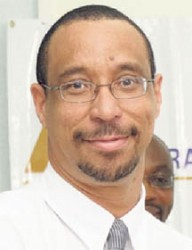The Caribbean Association of Industry and Commerce (CAIC) is looking for an overhaul by strategizing an integrated public-private partnership within Caricom in the slipstream of what has been described as the failed Economic Partnership Agreement (EPA) between Cariforum and the European Union.
Vice President of CAIC, Rollin Bertrand, stated that “we are now seeking to resuscitate the organization bring back our membership, certainly get the message across to our membership that our voice is important because they can’t be formulating all of these trade policy agreements without private sector input and asking us now to go and trade within the umbrella of a trade agreement if we were not part of the formulation of the agreement.”
Bertrand stated at a media briefing held at the Private Sector Commission’s office yesterday on Waterloo Street that the various organs under Caricom are not equipped with the requisite mechanisms to adequately engage the private sector in a meaningful way. He said that this unfortunately was a very real shortcoming that CAIC was looking to rectify.

He said that in particular the EPA, first conceptualized in 2008, was designed to confront many of those hurdles between the EU and Cariforum countries, however the reality was gravely different. Bertrand stated that there have been examples where quality standards have gravely hindered trade within the region. He said that in one particular case a certification process took over three years. “We recognize that quality standards are very important but some of the processes to get certified we find are extremely protracted.”
He noted that in this particular case the company was ISO certified and met all the local, regional and international standards for the product the company was attempting to export to EU territories within the Caribbean.
Dav-Ernan Kowlessar, CAIC secretary, stated that the EPA “has not allowed us full access that we have envisioned”, adding that the under the public-private partnership that was discussed with the Secretary General of Caricom, Irwin LaRocque earlier in the day, this would be addressed moving forward.
Kowlessar said that by encouraging trade and exports the CAIC could measure barriers and put in frameworks with the backing of Caricom. Responding to questions, he said that currently collecting data on the potential or real losses due to the various barriers was not being done.
He was in agreement with Bertrand and stated that the information was difficult to acquire because many private entities wouldn’t report failed trade attempts and on the flip side those who were successful would act to enjoy the lucrative benefits and may be wary of sharing that information.
Kowlessar stated that currently the mechanisms to foster public-private partnerships aren’t there and neither is the culture. He noted that in the overhauling of CAIC the entity would be working aggressively within the Caricom Secretariat to have more of an input.
President of the CAIC, Ramesh Dookhoo, told members of the media that the non-tariff barriers not written in stone represented a lack of harmonization in Caribbean standards. He said that one such area that CAIC was looking to really make an impact on was in relation to shipping in the Caribbean. Dookhoo stated that companies have long complained that the financial loss and the logistics are crippling to business growth.
He said that discussions with Caricom’s Secretary-General earlier in the day were fruitful and that the proposed public-private partnerships was met with support. The CAIC will be meeting with the Caricom Council for Trade and Economic Develop-ment (COTED) in May to further discuss how to incorporate mechanisms that would encourage trade within the region. Dookhoo reiterated that the goal was to “harmonize standards in the Caribbean.”
At the Twenty-Fifth Inter-sessional meeting of the Conference of Heads of Government of Caricom, 10-11march 2014, in St Vincent, the Heads agreed to have a high-level consultation with Leaders of Commerce and Industry at their July Meeting. A communique from the meeting said that this consultation would tackle the institutional reform agenda and the scope for promoting public-private partnerships to support the infrastructural development required for a vibrant and dynamic private sector and sustainable growth in Caricom.




